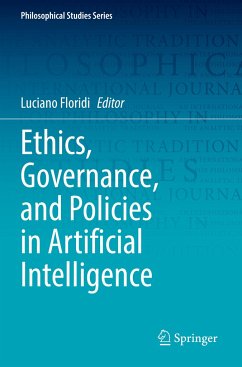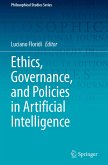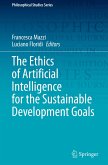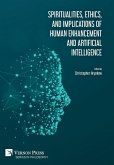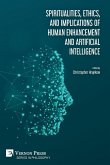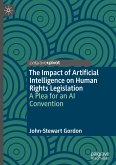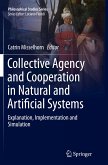Ethics, Governance, and Policies in Artificial Intelligence
Herausgegeben:Floridi, Luciano
Ethics, Governance, and Policies in Artificial Intelligence
Herausgegeben:Floridi, Luciano
- Broschiertes Buch
- Merkliste
- Auf die Merkliste
- Bewerten Bewerten
- Teilen
- Produkt teilen
- Produkterinnerung
- Produkterinnerung
This book offers a synthesis of investigations on the ethics, governance and policies affecting the design, development and deployment of artificial intelligence (AI). Each chapter can be read independently, but the overall structure of the book provides a complementary and detailed understanding of some of the most pressing issues brought about by AI and digital innovation. Given its modular nature, it is a text suitable for readers who wish to gain a reliable orientation about the ethics of AI and for experts who wish to know more about specific areas of the current debate.
Andere Kunden interessierten sich auch für
![Ethics, Governance, and Policies in Artificial Intelligence Ethics, Governance, and Policies in Artificial Intelligence]() Ethics, Governance, and Policies in Artificial Intelligence116,99 €
Ethics, Governance, and Policies in Artificial Intelligence116,99 €![The Ethics of Artificial Intelligence for the Sustainable Development Goals The Ethics of Artificial Intelligence for the Sustainable Development Goals]() The Ethics of Artificial Intelligence for the Sustainable Development Goals88,99 €
The Ethics of Artificial Intelligence for the Sustainable Development Goals88,99 €![Spiritualities, ethics, and implications of human enhancement and artificial intelligence Spiritualities, ethics, and implications of human enhancement and artificial intelligence]() Ray KurzweilSpiritualities, ethics, and implications of human enhancement and artificial intelligence69,99 €
Ray KurzweilSpiritualities, ethics, and implications of human enhancement and artificial intelligence69,99 €![Spiritualities, ethics, and implications of human enhancement and artificial intelligence Spiritualities, ethics, and implications of human enhancement and artificial intelligence]() Ray KurzweilSpiritualities, ethics, and implications of human enhancement and artificial intelligence60,99 €
Ray KurzweilSpiritualities, ethics, and implications of human enhancement and artificial intelligence60,99 €![The Impact of Artificial Intelligence on Human Rights Legislation The Impact of Artificial Intelligence on Human Rights Legislation]() John-Stewart GordonThe Impact of Artificial Intelligence on Human Rights Legislation33,99 €
John-Stewart GordonThe Impact of Artificial Intelligence on Human Rights Legislation33,99 €![Collective Agency and Cooperation in Natural and Artificial Systems Collective Agency and Cooperation in Natural and Artificial Systems]() Collective Agency and Cooperation in Natural and Artificial Systems37,99 €
Collective Agency and Cooperation in Natural and Artificial Systems37,99 €![Ethics and Policies for Cyber Operations Ethics and Policies for Cyber Operations]() Ethics and Policies for Cyber Operations95,99 €
Ethics and Policies for Cyber Operations95,99 €-
-
-
This book offers a synthesis of investigations on the ethics, governance and policies affecting the design, development and deployment of artificial intelligence (AI). Each chapter can be read independently, but the overall structure of the book provides a complementary and detailed understanding of some of the most pressing issues brought about by AI and digital innovation. Given its modular nature, it is a text suitable for readers who wish to gain a reliable orientation about the ethics of AI and for experts who wish to know more about specific areas of the current debate.
Produktdetails
- Produktdetails
- Philosophical Studies Series 144
- Verlag: Springer / Springer International Publishing / Springer, Berlin
- Artikelnr. des Verlages: 978-3-030-81909-5
- 1st ed. 2021
- Seitenzahl: 408
- Erscheinungstermin: 4. November 2022
- Englisch
- Abmessung: 235mm x 155mm x 21mm
- Gewicht: 690g
- ISBN-13: 9783030819095
- ISBN-10: 3030819094
- Artikelnr.: 66003289
- Philosophical Studies Series 144
- Verlag: Springer / Springer International Publishing / Springer, Berlin
- Artikelnr. des Verlages: 978-3-030-81909-5
- 1st ed. 2021
- Seitenzahl: 408
- Erscheinungstermin: 4. November 2022
- Englisch
- Abmessung: 235mm x 155mm x 21mm
- Gewicht: 690g
- ISBN-13: 9783030819095
- ISBN-10: 3030819094
- Artikelnr.: 66003289
Luciano Floridi is Professor of Philosophy and Ethics of Information at the University of Oxford, where he directs the Digital Ethics Lab of the Oxford Internet Institute, and is Fellow of Exeter College. He is also Turing Fellow of the Alan Turing Institute. His research concerns primarily Information and Computer Ethics (aka Digital Ethics), the Philosophy of Information, and the Philosophy of Technology. Other research interests include Epistemology, Philosophy of Logic, and the History and Philosophy of Skepticism. He has published over a 150 papers in these areas, in many anthologies and peer-reviewed journals. His works have been translated into many languages, including Arabic, Chinese, Dutch, French, German, Greek, Hungarian, Italian, Japanese, Lithuanian, Persian, Polish, Portuguese, Russian, and Spanish. His lifetime project is a tetralogy (not his term) on the foundation of the philosophy of information, called Principia PhilosophiaeInformationis.
Acknowledgement.- Chapter 1. Introduction - The Importance of an Ethics First Approach to the Development of AI (Luciano Floridi).- Chapter 2. A unified framework of Five Principles for AI in Society (Luciano Floridi and Josh Cowls).- Chapter 3. An Ethical framework for a Good AI Society: Opportunities, Risks, Principles and Recommendations (Luciano Floridi, Josh Cowls, Monica Beltrametti, Raja Chatila, Patrice Chazerand, Virginia Dignum, Christoph Luetge, Robert Madelin, Ugo Pagallo, Francesca Rossi, Burkhard Schafer, Peggy Valcke and Effy Vayena).- Chapter 4. Establishing the Rules for Building Trustworthy AI (Luciano Floridi).- Chapter 5. The Chinese Approach to AI: An Analysis of Policy, Ethics, and Regulation (Huw Roberts, Josh Cowls, Jessica Morley, Mariarosaria Taddeo, Vincent Wang and Luciano Floridi).- Chapter 6. Translating Principles into Practices of Digital Ethics: Five Risks of Being Unethical (Luciano Floridi).- Chapter 7. How AI can be a force for good (MariarosariaTaddeo and Luciano Floridi).- Chapter 8. The Ethics of Algorithms (Andreas Tsamados, Nikita Aggarwal, Josh Cowls, Jessica Morley, Huw Roberts, Mariarosaria Taddeo and Luciano Floridi).- Chapter 9. How to Design AI for Social Good: Seven Essential Factors (Luciano Floridi, Josh Cowls, Thomas C King and Mariarosaria Taddeo).- Chapter 10. From What to How: An initial Review of Publicly Available AI Ethics Tools, Methods and Research to Translate Principles into Practices (Jessica Morley, Luciano Floridi, Libby Kinsey and Anat Elhalal).- Chapter 11. The Explanation Game: A Formal Framework for Interpretable Machine Learning (David Watson and Luciano Floridi).- Chapter 12. Artificial Agents and Their Moral Nature (Luciano Floridi).- Chapter 13. Artificial Intelligence Crime: An Interdisciplinary Analysis of Foreseeable Threats and Solutions (Thomas C King, Nikita Aggarwal, Mariarosaria Taddeo and Luciano Floridi).- Chapter 14. Regulate Artificial Intelligence to Avert Cyber Arms Race (Mariarosaria Taddeo and Luciano Floridi).- Chapter 15. Trusting Artificial Intelligence in Cybersecurity is a Double-edged Sword (Mariarosaria Taddeo, Tom McCutcheon and Luciano Floridi).- Chapter 16. Prayer-bots and Religious Worship on Twitter: A Call for a Wider Research Agenda (Carl Öhman, Robert Gorwa and Luciano Floridi).- Chapter 17. Artificial Intelligence, Deepfakes and a Future of Ectypes (Luciano Floridi).- Chapter 18. The Ethics of AI in Healthcare: A Mapping Review (Jessica Morley, Caio Machado, Christopher Burr, Josh Cowls, Indra Joshi, Mariarosaria Taddeo and Luciano Floridi).- Chapter 19. Autonomous Vehicles: from Whether and When to Where and How (Luciano Floridi).- Chapter 20. Innovating with Confidence: Embedding AI Governance and Fairness in a Financial Services Risk Management Framework (Michelle Lee, Luciano Floridi and Alexander Denev).- Chapter 21. Robots, Jobs, Taxes and Responsibilities (Luciano Floridi).- Chapter 22. What the Near Future of Artificial IntelligenceCould Be (Luciano Floridi).
Acknowledgement.- Chapter 1. Introduction - The Importance of an Ethics First Approach to the Development of AI (Luciano Floridi).- Chapter 2. A unified framework of Five Principles for AI in Society (Luciano Floridi and Josh Cowls).- Chapter 3. An Ethical framework for a Good AI Society: Opportunities, Risks, Principles and Recommendations (Luciano Floridi, Josh Cowls, Monica Beltrametti, Raja Chatila, Patrice Chazerand, Virginia Dignum, Christoph Luetge, Robert Madelin, Ugo Pagallo, Francesca Rossi, Burkhard Schafer, Peggy Valcke and Effy Vayena).- Chapter 4. Establishing the Rules for Building Trustworthy AI (Luciano Floridi).- Chapter 5. The Chinese Approach to AI: An Analysis of Policy, Ethics, and Regulation (Huw Roberts, Josh Cowls, Jessica Morley, Mariarosaria Taddeo, Vincent Wang and Luciano Floridi).- Chapter 6. Translating Principles into Practices of Digital Ethics: Five Risks of Being Unethical (Luciano Floridi).- Chapter 7. How AI can be a force for good (MariarosariaTaddeo and Luciano Floridi).- Chapter 8. The Ethics of Algorithms (Andreas Tsamados, Nikita Aggarwal, Josh Cowls, Jessica Morley, Huw Roberts, Mariarosaria Taddeo and Luciano Floridi).- Chapter 9. How to Design AI for Social Good: Seven Essential Factors (Luciano Floridi, Josh Cowls, Thomas C King and Mariarosaria Taddeo).- Chapter 10. From What to How: An initial Review of Publicly Available AI Ethics Tools, Methods and Research to Translate Principles into Practices (Jessica Morley, Luciano Floridi, Libby Kinsey and Anat Elhalal).- Chapter 11. The Explanation Game: A Formal Framework for Interpretable Machine Learning (David Watson and Luciano Floridi).- Chapter 12. Artificial Agents and Their Moral Nature (Luciano Floridi).- Chapter 13. Artificial Intelligence Crime: An Interdisciplinary Analysis of Foreseeable Threats and Solutions (Thomas C King, Nikita Aggarwal, Mariarosaria Taddeo and Luciano Floridi).- Chapter 14. Regulate Artificial Intelligence to Avert Cyber Arms Race (Mariarosaria Taddeo and Luciano Floridi).- Chapter 15. Trusting Artificial Intelligence in Cybersecurity is a Double-edged Sword (Mariarosaria Taddeo, Tom McCutcheon and Luciano Floridi).- Chapter 16. Prayer-bots and Religious Worship on Twitter: A Call for a Wider Research Agenda (Carl Öhman, Robert Gorwa and Luciano Floridi).- Chapter 17. Artificial Intelligence, Deepfakes and a Future of Ectypes (Luciano Floridi).- Chapter 18. The Ethics of AI in Healthcare: A Mapping Review (Jessica Morley, Caio Machado, Christopher Burr, Josh Cowls, Indra Joshi, Mariarosaria Taddeo and Luciano Floridi).- Chapter 19. Autonomous Vehicles: from Whether and When to Where and How (Luciano Floridi).- Chapter 20. Innovating with Confidence: Embedding AI Governance and Fairness in a Financial Services Risk Management Framework (Michelle Lee, Luciano Floridi and Alexander Denev).- Chapter 21. Robots, Jobs, Taxes and Responsibilities (Luciano Floridi).- Chapter 22. What the Near Future of Artificial IntelligenceCould Be (Luciano Floridi).

